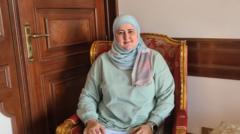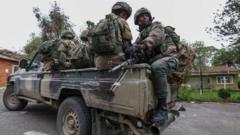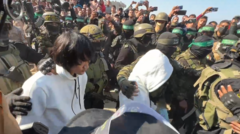As Lebanon endures a tumultuous period of conflict and displacement, a remarkable initiative has emerged to assist those in need. Hania Zataari, a mechanical engineer dedicated to helping her community, developed a WhatsApp chatbot called the "aidbot" to streamline the distribution of aid to displaced families.
Empowering Displaced Families: The Aidbot Revolution in Lebanon

Empowering Displaced Families: The Aidbot Revolution in Lebanon
A groundbreaking WhatsApp chatbot created by Hania Zataari aims to ease the burdens of families displaced by conflict in Lebanon.
Hailing from Sidon, South Lebanon, Zataari initiated this project last autumn amid escalating violence from Israel's military operations against Hezbollah, culminating in one of Lebanon's deadliest conflicts in nearly two decades. Thousands of individuals fled their homes due to airstrikes targeting Hezbollah positions, leading many to seek refuge in schools or rely on family and friends. Zataari observed that those displaced were often overlooked by governmental support, which prompted her to create the aidbot as a bridge between demand and supply for essential resources.
Working from her own spare time, Zataari employed her programming expertise to build a user-friendly chatbot via Callbell.eu, which is designed for customer engagement on platforms like WhatsApp. The aidbot simplifies the process by collecting users' details regarding their needs—such as food, mattresses, and medical supplies—and logging that information onto a Google spreadsheet accessible to a team of volunteers assisting with aid distribution.
The project, reliant on donations from the Lebanese diaspora, has already seen impressive results. They have delivered numerous food parcels, mattresses, and blankets to those in need. Testimonies from beneficiaries like Khaldoun Abbas underline the profound impact of the initiative, as his family turned to the aidbot when forced to flee their homes after receiving warnings of imminent danger.
Even amidst challenges posed by Lebanon's ongoing financial crisis, Zataari remains committed, ordering supplies from neighboring Syria to meet demand. While international NGOs face their own funding shortages, the innovative use of technology in this context introduces new possibilities for humanitarian assistance.
Experts laud the aidbot concept, with John Bryant from the Overseas Development Institute noting its cultural relevance; however, he also cautions that scalability remains a concern. Zataari's project may not solve all challenges faced by displaced individuals, but for many, it offers a lifeline in a time of chaos, providing crucial support tailored to their unique circumstances.
Working from her own spare time, Zataari employed her programming expertise to build a user-friendly chatbot via Callbell.eu, which is designed for customer engagement on platforms like WhatsApp. The aidbot simplifies the process by collecting users' details regarding their needs—such as food, mattresses, and medical supplies—and logging that information onto a Google spreadsheet accessible to a team of volunteers assisting with aid distribution.
The project, reliant on donations from the Lebanese diaspora, has already seen impressive results. They have delivered numerous food parcels, mattresses, and blankets to those in need. Testimonies from beneficiaries like Khaldoun Abbas underline the profound impact of the initiative, as his family turned to the aidbot when forced to flee their homes after receiving warnings of imminent danger.
Even amidst challenges posed by Lebanon's ongoing financial crisis, Zataari remains committed, ordering supplies from neighboring Syria to meet demand. While international NGOs face their own funding shortages, the innovative use of technology in this context introduces new possibilities for humanitarian assistance.
Experts laud the aidbot concept, with John Bryant from the Overseas Development Institute noting its cultural relevance; however, he also cautions that scalability remains a concern. Zataari's project may not solve all challenges faced by displaced individuals, but for many, it offers a lifeline in a time of chaos, providing crucial support tailored to their unique circumstances.






















